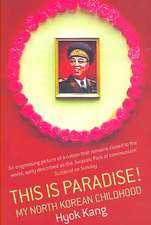An Exhibit Denied: Lobbying the History of Enola Gay
Autor Martin Harwiten Limba Engleză Paperback – 18 apr 2012
Preț: 317.39 lei
Nou
Puncte Express: 476
Preț estimativ în valută:
60.74€ • 62.75$ • 50.55£
60.74€ • 62.75$ • 50.55£
Carte disponibilă
Livrare economică 04-18 martie
Preluare comenzi: 021 569.72.76
Specificații
ISBN-13: 9781468479072
ISBN-10: 1468479075
Pagini: 504
Ilustrații: XXVI, 477 p.
Dimensiuni: 155 x 235 x 26 mm
Greutate: 0.7 kg
Ediția:Softcover reprint of the original 1st ed. 1996
Editura: Springer
Colecția Copernicus
Locul publicării:New York, NY, United States
ISBN-10: 1468479075
Pagini: 504
Ilustrații: XXVI, 477 p.
Dimensiuni: 155 x 235 x 26 mm
Greutate: 0.7 kg
Ediția:Softcover reprint of the original 1st ed. 1996
Editura: Springer
Colecția Copernicus
Locul publicării:New York, NY, United States
Public țintă
Popular/generalDescriere
At 8:15 A.M., August 6, 1945, the Enola Gay released her load. For forty three seconds, the world's first atomic bomb plunged through six miles of clear air to its preset detonation altitude. There it exploded, destroying Hiroshima and eighty thousand of her citizens. No war had ever seen such instant devastation. Within nine days Japan surrendered. World War II was over and a nuclear arms race had begun. Fifty years later, the National Air and Space Museum was in the final stages of preparing an exhibition on the Enola Gay's historic mission when eighty-one members of Congress angrily demanded cancellation of the planned display and the resignation or dismissal of the museum's director. The Smithsonian tnstitution, of which the National Air and Space Museum is a part, is heavily dependent on congressional funding. The Institution's chief executive, Smithsonian Secretary I. Michael Heyman, in office only four months at the time, scrapped the exhibit as requested, and promised to personally oversee a new display devoid of any historic context. In the wake of that decision I resigned as the museum's director and left the Smithsonian.
Cuprins
1 Remembrances.- 2 A Solemn Vow.- 3 The National Air and Space Museum.- 4 A New Director.- 5 A Reluctant Start.- 6 Searching for a Home to Display the Enola Gay.- 7 Planning an Exhibition.- 8 The Impatient Veteran.- 9 An Enthusiastic Advocate.- 10 Restoration and Authenticity.- 11 A Smithsonian Debate.- 12 A Battle for the Museum Extension.- 13 Only Five Old Men.- 14 Japan.- 15 Funding and Approval.- 16 Losing Friends.- 17 The Script.- 18 Once-Secret Documents.- 19 The AFA Lobbies for Its Own Version of History.- 20 An Intricate Military Web.- 21 Internal Dissent and Regrouping.- 22 A Search for New Allies.- 23 The Military Coalition and the Service Historians.- 24 The Media and a National Museum’s Defenses.- 25 Negotiating the Script.- 26 The New Secretary—Smithsonian Support Wavers.- 27 Japanese Doubts.- 28 Cancellation.- 29 The Immediate Aftermath.- 30 The Last Act.- Epilogue.- Chronology of Significant Events 43.- Notes.
Recenzii
"Utterly fascinating, candid, and very clear...The book has genuine narrative power and human interest, and offers a profound parable for the politics of culture in our time...(A) powerful yet subdued and poignant account." Michael Kammen, Cornell University











